- Home
- Thomas Cahill
How the Irish Saved Civilization Page 2
How the Irish Saved Civilization Read online
Page 2
The omnipotence and immensity of this empire—embracing, as it did, “the whole of the civilized world”—are not the qualities that would strike us were we to soar above the Mediterranean on that fateful day. What we would discern is the very opposite of power—fragility, specifically geographic fragility. “We live around a sea,” the perspicacious Socrates had reminded his listeners, “like frogs around a pond.” For all the splendor of Roman standard, the power of Roman boot, and the extent of Roman road, the entire empire hugs the Mediterranean like a child’s village of sand, waiting to be swept into the sea. From fruitful Gaul and Britain in the north to the fertile Nile Valley in the south, from the rocky Iberian shore in the west to the parched coasts of Asia Minor, all provinces of the empire turn toward the great sea, toward Medi-Terra-nea—the Sea of Middle Earth. And as they turn to the center of their world, they turn their back on all that lies behind them, beyond the Roman wall. They turn their back on the barbarians.
That Rome should ever fall was unthinkable to Romans: its foundations were unassailable, sturdily sunk in a storied past and steadily built on for eleven centuries and more. There was, of course, the prophecy. Someone, usually someone in his cups, could always be counted on to bring up that old saw: the Prophecy of the Twelve Eagles, each eagle representing a century, leaving us with—stubby fingers counting out the decades in a puddle of wine—only seventy years remaining! Give or take a decade! Predictable laughter at the silliness of the whole idea. But in seventy years exactly, the empire would be gone.
Eternal Rome, eleven centuries old, hardly foresaw its doom. But theories about its fall are very old indeed. Two dozen years after this Roman-barbarian encounter along the Rhine, Augustine of Hippo, second city of Roman Africa, will be lying on his deathbed, listening to the clamor of another wave of barbarians as they attack the walls of his city. He has barely finished the final pages of his great defense of Christianity—The City of God—written to contradict the Roman pagans who discerned behind the barbarian assaults the old gods of Rome, angry at being forsaken by Christian converts. (No, insists Augustine eloquently, it is not Christianity but vice-encumbered paganism that is bringing the empire down.) Nine centuries later, as impressive feats of Roman engineering and sculpture are being dug up all over Italy at the dawn of the Renaissance, the question of what became of the cultural giants who built these things will be on everyone’s lips. Petrarch, the Tuscan poet and scholar who is rightly remembered as the father of Renaissance humanism, rediscovers the concept of a “fall,” which, following Augustine’s lead, he blames on the empire’s internal faults. Machiavelli, writing a century and a half later in a less spiritual, more cynical time, will blame the barbarians.
When the first volume of Edward Gibbon’s The History of the Decline and Fall of the Roman Empire appeared in 1776, it raised far more lively interest in London than the news from the troublesome colonies in North America. “The decline of Rome,” wrote Gibbon, “was the natural and inevitable effect of immoderate greatness.” Such a perception fit well with the cool and rational temper of the time. But as the more conventional English gentlemen of the late eighteenth century continued to turn the pages of Mr. Gibbon’s discourse, their blood began to boil. “As the happiness of a future life is the great object of religion,” he continued, “we may hear, without surprise or scandal, that the introduction, or at least the abuse, of Christianity had some influence on the decline and fall of the Roman empire. The clergy successfully preached the doctrines of patience and pusillanimity; the active virtues of society were discouraged; and the last remains of the military spirit were buried in the cloister; a large portion of public and private wealth was consecrated to the specious demands of charity and devotion; and the soldiers’ pay was lavished on the useless multitudes of both sexes, who could only plead the merits of abstinence and chastity.”
Shock was registered and rebuttals issued, and Mr. Gibbon hastened to defend himself in his Vindication. But, in truth, his theory was no novelty, being scarcely distinguishable from the pagan theory Augustine had taken up the cudgels against more than thirteen centuries earlier. Nor was it devoid of merit. Still, it is helpful to know a little of Gibbon’s own history: at sixteen, an intense convert to Catholicism, packed off to Switzerland by his outraged father, where he was reconverted to Protestantism (this time, of the Calvinist variety) and, almost simultaneously, to the uncompromising skepticism of Voltaire, whom he met. The permanent effect on the mature man of so many—and contradictory—youthful passions may easily be guessed.
These earlier interpreters—first the pagan critics of Christianity, then Augustine, Petrarch, Machiavelli, and Gibbon—have defined the limits of all later interpretation: Rome fell because of inner weakness, either social or spiritual; or Rome fell because of outer pressure—the barbarian hordes. What we can say with confidence is that Rome fell gradually and that Romans for many decades scarcely noticed what was happening.
Clues to the character of the Roman blindness are present in the scene along the frozen Rhine. The legionnaires on the Roman bank know that they have the upper hand, and that they always will have. Even though some are only half-civilized recruits recently settled on this side of the river, they are now Romans, inheritors of nearly twelve centuries of civilization, husbandry, agriculture, viniculture, horticulture, cuisine, arts, literature, philosophy, law, politics, martial prowess—and all the “gear and tackle and trim” that goes with these pursuits. The world has never known anything as deep, as lasting, or as extensive as Pax Romana, the peace and predictability of Roman civilization. Inspecting the Roman soldiers now, we note the quiet authority of their presence, the polish of their person, the appropriateness of their stance—they are spiffy. More than this, there is an esthetic to each gesture and accoutrement. All details have been considered—ad unguent, as they would say, to the fingertip, as a sculptor tests the smoothness and perfection of his finished marble. Their hair is cut with a thought to the shape of the head, they are clean-shaven to show off the resoluteness of the jawline, their dress—from their impregnable but shapely breastplates to their easy-movement skirts—is designed with the form and movement of the body in mind, and their hard physiques recall the proportions of Greek statuary. Even the food in the mess is prepared to be not only savory to the taste but attractive to the eye. Just now the architriclinus—the chef—is beginning to prepare the carrots: he slices each piece lengthwise, then lengthwise again, to achieve slender, elongated triangles.
We look out across the river to the barbarian hosts, who in the slanting, gray light of winter mass like figures in a nightmare. Their hair (both of head and face) is uncut, vilely dressed with oil, braided into abhorrent shapes. Their bodies are distorted by ornament and discolored by paint. Some of the men are huge and muscular to the point of deformity, their legs wrapped comically in the garments called braccae—breeches. There is no discipline among them: they bellow at each other and race about in chaos. They are dirty, and they stink. A crone in a filthy blanket stirs a cauldron, slicing roots and bits of rancid meat into the concoction from time to time. She slices a carrot crosswise up its shaft, so that the circular pieces she cuts off float like foolish yellow eyes on the surface of her brew.
This unequal portrait of the two forces would not only have been the Roman view: it could almost have been the German view as well (for the milling hosts are of Germanic origin, as are all the intruders of this period). To the Romans, the German tribes were riffraff; to the Germans, the Roman side of the river was the place to be. The nearest we can come to understanding this divide may be the southern border of the United States. There the spit-and-polish troops are immigration police; the hordes, the Mexicans, Haitians, and other dispossessed peoples seeking illegal entry. The barbarian migration was not perceived as a threat by Romans, simply because it was a migration—a year-in, year-out, raggle-taggle migration—and not an organized, armed assault. It had, in fact, been going on for centuries. The Gauls had been the first ba
rbarian invaders, hundreds of years before, and now Gaul lay at peace. The verses of its poets and the products of its vineyards were twin fountains of Roman inspiration. The Gauls had become more Roman than the Romans themselves. Why could not the same thing happen to these Vandals, Alans, and Sueves, now working themselves to a fever pitch on the far side of the river?
When, at last, the hapless Germans make their charge across the bridge of ice, it is head-on, without forethought or strategy. With preposterous courage they teem across the Rhine in convulsive waves, their principal weapon their own desperation. We get a sense of their numbers, as well as their desperation, in a single casualty count: the Vandals alone are thought to have lost twenty thousand men (not counting women and children) at the crossing. Despite their discipline, the Romans cannot hold back the Germanic sea.
From one perspective, at least, the Romans were overwhelmed by numbers—not just in this encounter but during centuries of migrations across the porous borders of the empire. Sometimes the barbarians came in waves, though seldom as big as this one. More often they came in trickles: as craftsmen who sought honest employment, as warriors who enlisted with the Roman legions, as tribal chieftains who paid for land, as marauders who burned and looted and sometimes raped and murdered.
What set them on the move was agriculture, which they had learned from their Roman neighbors. As the barbarian societies to the north of the empire turned from the nomadic ways of the hunter to the settled ways of the farmer, a seasonally predictable store of grain caused the inevitable population explosion. For all too obvious reasons, farmers live longer lives and see far more of their young reach adulthood than do hunters, whose precarious lives—and those of their progeny—are lived like an ecological high-wire act played without a net. For farmers, the safety net is the grain supply—more food than they need right now. This ancient form of money in the bank has served from time immemorial as the basis for long life, long-term planning, and all the arts of civilization.
But the complete formula is as invariable as it is archaic: economic success in the form of a store of grain triggers a population explosion, which quickly triggers the need to acquire new land to feed new mouths. Eleven centuries prior to the encounter on the Rhine, an insignificant band of Latin-speaking farmers “had but recently settled down to fixed agriculture and solved the problem of rapidly growing numbers by embarking upon a career of conquest that ultimately eventuated in the Roman empire,” remarks the contemporary historian William McNeill. “Considered in this light, the Roman state in the West was destroyed by the same forces that had created it.”
McNeill thus takes the sensible, need-based route of Machiavelli. But, as the classical historians have shown us, there are other lights in which to consider this enormous transformation. Why was the border guard so thin? Did the Romans not notice—at some point—that their way of life was changing forever? Did they not think to do something about it besides bow to the inevitable? What were they thinking about? In order to answer these questions and gain a fuller picture of Roman society, we turn to a typical Roman who helped to build the world of late antiquity.
The barbarian onslaught across the frozen Rhine occurred in the first decade of the fifth century. Let us step back a bit—into the fourth century—and meet a man whose style of life can show us some of the yawning absences in Roman society, absences that would lead directly to the calamities of the fifth century. He is Ausonius the poet, and he kept an impressively large, exquisitely maintained country estate in Bordeaux in the province of Gaul and, after his father’s death, another equally impressive estate in Aquitaine. Born just one hundred years before the German migration over the Rhine, he was raised not by his mother, of whom he doesn’t seem to have had especially fond memories, but by two battle-axes, a grandmother and an aunt, both named Aemilia.
In his Parentalia, which might best be translated Obsequies for the Forebears, he extols their virtues. Of Grandmother Aemilia, he recalls:
et non deliciis ignoscere prompta pudendis
ad perpendiculum seque suosque habuit.
To questionable pleasures she gave no quarter,
but held both herself and her household rigidly upright.
The other Aemilia seems to have been rather large:
Aemilia, in cunis Hilari cognomen adepta,
quod laeta et pueri comis ad effigiem,
reddebas verum non dissimulanter ephebum.
Aemilia, nicknamed Lusty in your cradle,
because you were as much fun as a boy—
and, without trying, you always looked like a lad.
The rhetorical progression we are meant to notice here takes us through three stages of growth in three lines of poetry: infant (in cunis); boy (pueri); and adolescent (ephebum). Aemilia, though strapping, never grows quite as big as a man. Something, however, does keep growing in Aemilia.
Aunt Aemilia gets higher marks than Grandmother Aemilia, even if she must often have been severe toward the child Ausonius, who as a man designates her virgo devota—resolutely virginal—so resolute, in fact, that
feminei sexus odium tibi semper et inde
crevit devotae virginitatis amor.
hatred of the female sex forever grew within you
and from that sprang your love of consecrated maidenhood.
Though I am having some fun with this poetry, Ausonius is not. I am translating ambiguous lines to strengthen their ambiguity. Ausonius has surrounded these lines with conventional sentiments, no more fresh or interesting than what we might expect from a modern sympathy card. This, for instance, is how he ends the poem on his grandmother:
haec me praereptum cunis et ab ubere matris
blanda sub austeris inbuit inperiis.
tranquillos aviae cineres praestate, quieti
aeternum manes, si pia verba loquor.
By such kindnesses did she rear me—ripped from cradle and mother’s breast—but under the guise of stern commands.
Let my grandmother’s ashes rest in peace,
ever silent shades, if I say the proper prayers.
Ausonius’s friends might have been expected to notice that this is faint praise—but only because his praise indirectly draws attention to himself. Ah, dear Ausonius, they would have been expected to sigh, those women were hard on him, yet he remains so good, so loyal, fulfilling all the rites—pia verba, literally, faithful words—as is expected of him.
Ausonius’s poetry is full of pia verba; except for the occasional, only half-intentional epiphanies (as in the poems about the Aemilias), there is little else. There are endless sequences about forebears, about former teachers, about daily life, about classical subjects (the heroes of the Trojan War, the Twelve Caesars), endless word games, and endless imitations of Virgil. He has one hot poem, “Cento Nuptualis,” hot enough to be left untranslated in the Loeb Ausonius, where it has titillated as many generations of aging Latinists as it has frustrated generations of schoolboys—a clinical, cynical description of a bride’s deflowering on her wedding night. Yet even here he is deliberately unoriginal: every phrase is taken from the poems of Virgil. Thus does he mean to avoid censure by appealing to the ultimate literary authority and to win admiration by a dazzling display of his knowledge of Virgil. But, apart from these hommages, there is almost never a memorable phrase, just high-class jingles, written to formula. His letters, also endless, are no better: there is seldom any necessary information to be communicated, insights are scarce, and genuine emotion is almost entirely absent. Though his effete contemporaries compared Ausonius to Virgil and Cicero, practically all others have found themselves in agreement with the robust opinion of Gibbon: “The poetical fame of Ausonius condemns the taste of his age.”
How could a grown man have spent so much time so foolishly? Well, it’s what everyone else was doing. This is a static world. Civilized life, like the cultivation of Ausonius’s magnificent Bordeaux vineyards, lies in doing well what has been done before. Doing the expected is the highest value—
and the second highest is like it: receiving the appropriate admiration of one’s peers for doing it.
Though Ausonius is a Christian convert, as his “Oratio” shows, his Christianity is a cloak to be donned and removed, as needed. It was, no doubt, what everyone else was doing. His real worldview glimmers through all his work—a sort of agnostic paganism that enables him to evoke the silent shades of the pagan underworld without ever giving the reader the sense that he believes in any world but this one. In Ausonius—and all the other “best people” of the age, so like one another it is difficult to tell them apart—we see the flaw in Gibbon’s analysis of Rome’s fall. The vigorous gods of Rome were not eclipsed by some effeminate eastern fantasy religion. Fecund Venus and bloody Mars did not vacate the field to the pathetic, pacifist Christ. Rather, the life of the old religion had already drained away; and by the time Christianity came to the attention of the Roman gentry, the gods were shadows of their formerly lively selves—marginal, quieti manes, rustling through a dimly viewed eternity. It is no accident that when we today think of the Danube and the Rhine, the two rivers that divided the civilized world from the world of the northern barbarians, what come to mind are not the ghostly gods of Rome but the vigorous gods of the German tribes.

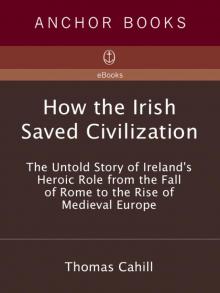 How the Irish Saved Civilization
How the Irish Saved Civilization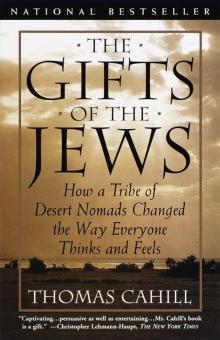 The Gifts of the Jews
The Gifts of the Jews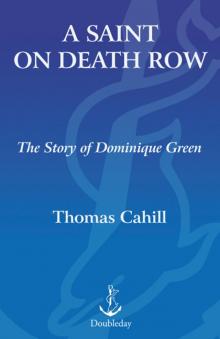 A Saint on Death Row
A Saint on Death Row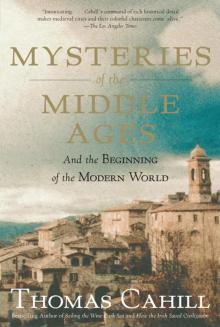 Mysteries of the Middle Ages
Mysteries of the Middle Ages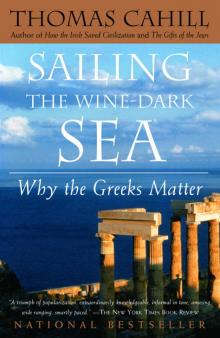 Sailing the Wine-Dark Sea
Sailing the Wine-Dark Sea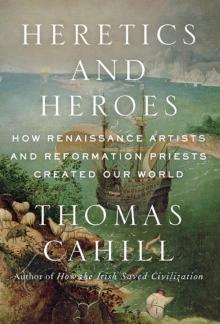 Heretics and Heroes
Heretics and Heroes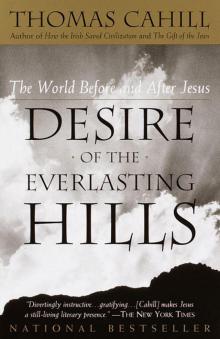 Desire of the Everlasting Hills
Desire of the Everlasting Hills